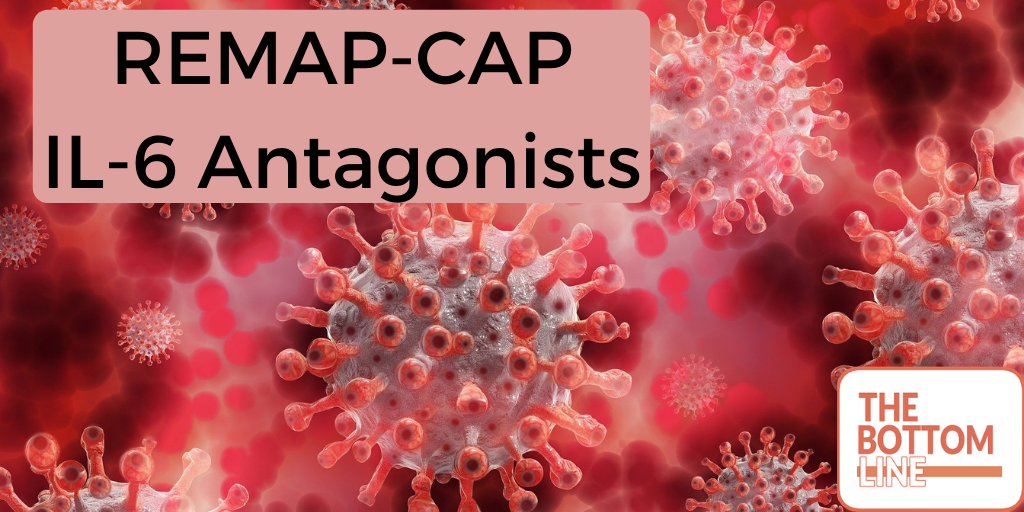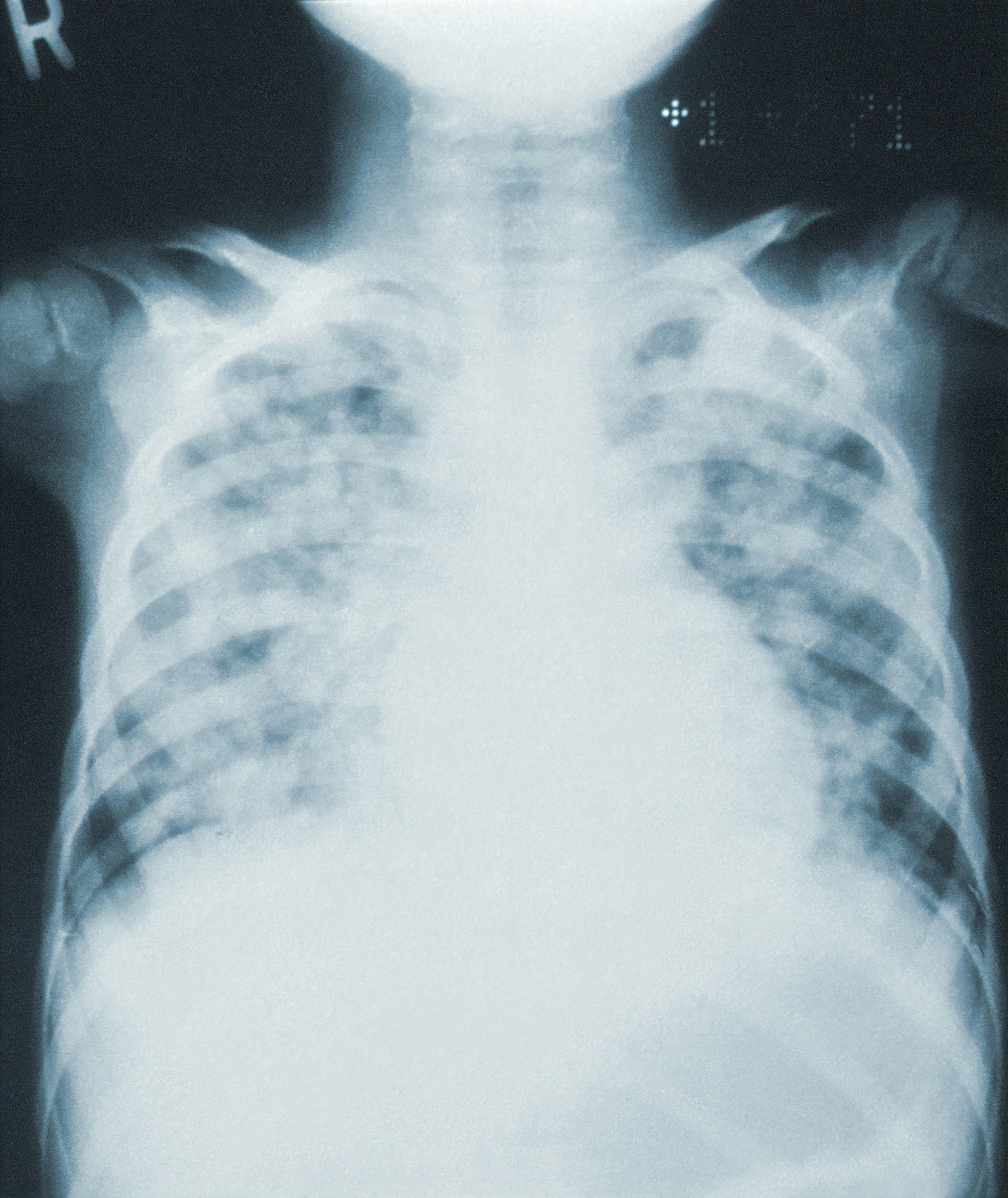REMAP-CAP IL-6

Interleukin-6 Receptor Antagonists in Critically Ill Patients with Covid-19 –
Preliminary report
Gordon. medRxix pre-print 2021. doi: https://doi.org/10.1101/2021.01.07.21249390
Clinical Question
- In critically ill patients with COVID-19, do the IL-6 receptor antagonists, tocilizumab and sarilumab, compared with standard care, improve respiratory and cardiovascular organ support free days up to day 21?
Background
- Globally COVID-19 has caused nearly 2 million deaths
- To date corticosteroids are the only medications that have been shown to improve survival. This may be due to their anti-inflammatory affects
- Interleukin-6 is released in response to infection and stimulates inflammatory pathways as part of the acute phase response
- Tocilizumab and sarilumab are monoclonal antibodies that inhibit the IL-6 receptor
- Randomised controlled trials to date have predominately shown no benefit from IL-6 antagonists, although the majority of patients included in these trials have not been critically unwell
- BACC (n=243, 5% non-invasive ventilation[NIV]/high-flow-nasal-cannula[HFNC]/mechanical ventilation[MV] at baseline) – no significant difference
- CORIMUNO-TOCI-1 (n=130, 0% NIV/HFNC/MV at basline) – no significant difference
- RCT-TCZ-COVID-19 (n=126, P/F ratio of 200-300, allowed HFNC at baseline but not mechanical ventilation) – no significant difference
- EMPACTA (n=389, 0% receiving NIV/MV) – patients who required ventilation or died within 28 days – significantly lower in tocilzumab group
- COVACTA (n=452, 67% receiving NIV/MV/ECMO at baseline) – no significant difference
Design
- Multifactorial adaptive platform trial (part of the REMAP-CAP trial)
- Open-label
- Blinded international trial steering committee
- Unblinded independent data and safety monitoring board
- Randomised via centralised computer programme
- Started with balanced assignment for each intervention and control (e.g. 1:1 if two interventions available, 1:1:1 if three interventions available)
- Immune modulation domain
- Investigators at each site selected a priori at least 2 of the 5 interventions, one of which had to be standard of care, to which patients would be randomised
- IL-6 receptor antagonists
- tocilizumab
- sarilumab
- IL-1 receptor antagonist
- anakira
- Interferon beta 1a
- Standard of care (no immune modulation)
- IL-6 receptor antagonists
- This paper reports the outcomes of the IL-6 receptor antagonist compared with standard of care
- Initially only tocilizumab was available
- Investigators at each site selected a priori at least 2 of the 5 interventions, one of which had to be standard of care, to which patients would be randomised
- Participants could be randomised to other interventions within other domains including antibiotics, plasma, dosing of anticoagulation prophylaxis
- Bayesian design with no maximum sample size
- Regular interim analyses, potentially with response-adaptive randomisation
- Primary analysis conducted on all severe state patients with COVID-19 randomised to any domain
- Analysis of primary outcome was repeated using only data from patients enrolled in domains that had stopped and were unblinded at the time of analysis with no adjustment for assignment in other ongoing domains
- Pre-defined statistical triggers for trial conclusion
- Multiple funders including Roche Products Ltd and Sanofi – they had no role in trial design, analysing data or publication
- Primary outcome was a composite ordinal outcome combining respiratory and cardiovascular support free days up to day 21. Patients who died within this time frame are assigned the worst outcome (-1). 1.5 days was considered a minimally important difference
Setting
- 113 sites across 6 countries, predominately in the UK
- Data collected from 19/04/20 – 19/11/20
Population
- Inclusion criteria:
- Critically ill adult patients with suspected or confirmed COVID-19
- Admitted to an intensive care unit
- Receiving respiratory or cardiovascular organ support
- Respiratory organ support defined as mechanical ventilation or non-invasive mechanical ventilation including via high flow nasal cannula if flow rate >30l/min and FiO2 >0.4
- Cardiovascular support defined as IV infusion of any vasopressor or inotrope
- Exclusion criteria:
- For overall REMAP-CAP trial
- Presumption that death was imminent; prior participation in REMAP-CAP within 90 days; >14 days while admitted to hospital with illness suspected or proved to pandemic infection
- Additional exclusion criteria specific to IL-6 domain
- >24 hours since ICU admission
- Condition or treatment resulting in ongoing immunosuppression including neutropenia
- Known or suspected pregnancy
- ALT/AST >5 times upper limit of normal
- Platelet <50
- For overall REMAP-CAP trial
- 2046 patients randomised in at least 1 domain in the severe disease state of REMAP-CAP, 895 patients randomised in the Immune Modulation domain (366 to tocilizumab, 48 to sarilumab, 412 to control, 69 to other interventions); 30 patients subsequently withdrew consent, 11 patients had missing primary outcome data
- Comparing baseline characteristics of tocilizumab vs. sarilumab vs. control group
- Number of patients: 353 vs. 48 vs. 402
- Age: 61.5 vs. 63.4 vs. 61.1 years
- Male: 74% vs. 81% vs. 70%
- Race/ethnicity
- White: 70% vs. 74% vs. 74%
- Asian: 18% vs. 21% vs. 17%
- Black: 5% vs. 3% vs. 3%
- BMI: 31 vs. 29 vs. 31
- APACHE II: 13 vs. 10. vs. 12
- Confirmed SARS-CoV2 infection: 82% vs. 94% vs. 85%
- Pre-existing conditions
- DM: 35% vs. 27% vs. 37%
- Renal disease: 10% vs. 9% vs. 12%
- Respiratory disease: 24% vs. 31% vs. 24%
- Time to enrolment (median)
- From hospital admission: 1.2 vs. 1.4 vs. 1.2 days
- From ICU admission: 13.1 vs. 16.0 vs. 14.0 hours
- Acute respiratory support
- High flow nasal oxygen: 29% vs. 35% vs. 27%
- Non-invasive ventilation: 42% vs. 48% vs. 42%
- Invasive mechanical ventilation: 30% vs. 17% vs. 30%
- Vasopressor support: 18% vs. 8% vs. 20%
- PaO2/FiO2 (median): 115 vs. 126 vs. 118
Intervention
- Either
- Tocilizumab
- 8mg/kg (max 800mg)
- Could be repeated 12-24 hours later at discretion of treating clinician
- 92% received at least 1 dose, 29% received 2nd dose
- Sarilumab
- 400mg once only
- 90% received allocated drug
- Tocilizumab
Control
- Standard care
- 2% were given one of the immune modulating drugs outside the trial protocol
Management common to both groups
- Patients could be randomised to other interventions in other domains of the REMAP-CAP trial
- This included corticosteroids until 17th June 2020 when randomisation to steroids was stopped
- 158 patients were recruited before June 17th, 107 were randomised to hydrocortisone domain: 41 allocated to 7 day course, and 39 to shock dependent hydrocortisone
- From June 17th 2020 corticosteroids were allowed as recommended standard of care. 707 patients were randomised after this date. 93% were treated with corticosteroids at enrolment or within 48 hours
Outcome
- Primary outcome: Median organ support-free days up to day 21 – significantly increased in intervention groups
- Comparing tocilizumab vs. sarilumab vs. standard of care groups
- 10 (IQR -1,16) vs. 11 (IQR 0,16) vs. 0 (IQR -1, 15)
- Compared with standard of care group (tocilizumab vs. sarilumab)
- Median adjusted OR (95% C.I.)
- 1.64 (1.25-2.14) vs. 1.76 (1.17-2.91)
- Posterior probability of superiority
- >99.9% vs. 99.5%
- Median adjusted OR (95% C.I.)
- Comparing tocilizumab vs. sarilumab vs. standard of care groups
- Subcomponents of primary outcome
- Hospital mortality – significantly reduced in intervention groups
- 28.0% vs. 22.2% vs. 35.8%
- Fragility index
- Tocilizumab vs. placebo: 3 patients
- Sarilumab vs. placebo: 0 patients
- Compared with standard of care group (tocilizumab vs. sarilumab)
- Median adjusted OR (95% C.I.)
- 1.64 (1.14-2.35) vs. 2.01 (1.18-4.71)
- Posterior probability of survival
- 99.6% vs. 99.5%
- NNT
- 13 vs. 8
- Median adjusted OR (95% C.I.)
- Hospital mortality – significantly reduced in intervention groups
- Secondary outcomes: Compared with standard of care group (tocilizumab vs. sarilumab)
- Significantly improved in intervention groups
- 90 day survival
- adjusted median HR (95% C.I.): 1.59 (1.24-2.05) vs. 1.82 (1.22-3.38)
- Respiratory support free days
- adjusted median OR: 1.72 (1.31-2.27) vs. 1.94 (1.27-3.32)
- Cardiovascular support free days
- Adjusted median OR: 1.68 (1.25-2.24) vs. 1.85 (1.2-3.3)
- Time to ICU discharge
- Adjusted median HR: 1.42 (1.18-1.7) vs. 1.64 (1.21-2.45)
- Progression to invasive ventilation, ECMO or death (restricted to those not intubated at baseline, n=552)
- 41.3% vs. 35.1% vs. 52.7%
- Adjusted median OR (95% C.I.): 1.69 (1.17-2.42) vs. 1.74 (1.01-3.14)
- 90 day survival
- No significant difference in
- Serious adverse events
- 2.5% vs. 0% vs. 2.7%
- Serious adverse events
- Significantly improved in intervention groups
Authors’ Conclusions
- In critically ill adult patients with COVID-19 receiving organ support in ICU, treatment with the IL-6 receptor antagonists, tocilizumab and sarilumab, improved outcomes including survival
Strengths
- Randomised controlled trial
- Multi-centre
- Blinding of steering committee
- Primary analysis included all patients randomised to any domain. With greater numbers of patients included in the trial we can have greater confidence in the results
- Trial sponsors had no involvement in design, writing or publication of the paper
Weaknesses
- Open label
- To date only short term outcomes known, and a number of patients remain in hospital
- Not all patients received drug allocated
- Nearly 5% of patients randomised lost to follow up/withdrew consent
- Low numbers of patients received Sarilumab
- Low fragility index
The Bottom Line
- The REMAP-CAP adaptive platform, open-label randomised controlled trial reported significantly greater organ support free days to day 21 with the use of the IL-6 receptor antagonists (tocilizumab or Sarilumab), compared with standard care
- Both hospital and 90 day mortality were also significantly reduced with the use of IL-6 receptor antagonists
- Four out of the five previous studies investigating the use of IL-6 antagonists for COVID-19 reported no significant differences. However, the majority of patients included in previous trials were not critically ill
- In light of the conflicting results and the low fragility index, further studies would be welcome, particularly in critically ill patients, to confirm the findings from this REMAP-CAP study. In the mean time, in patients not randomised to a trial, I will be prescribing IL-6 antagonists to critically ill patients with COVID-19 who meet the inclusion & exclusion criteria of this trial
External Links
- [article] Interleukin-6 Receptor Antagonists in Critically Ill Patients with Covid-19 – Preliminary report
Metadata
Summary author: @davidslessor
Summary date: 09/01/21
Peer-review editor: Charlotte Summers
Picture by: Gerd Altmann from Pixabay



